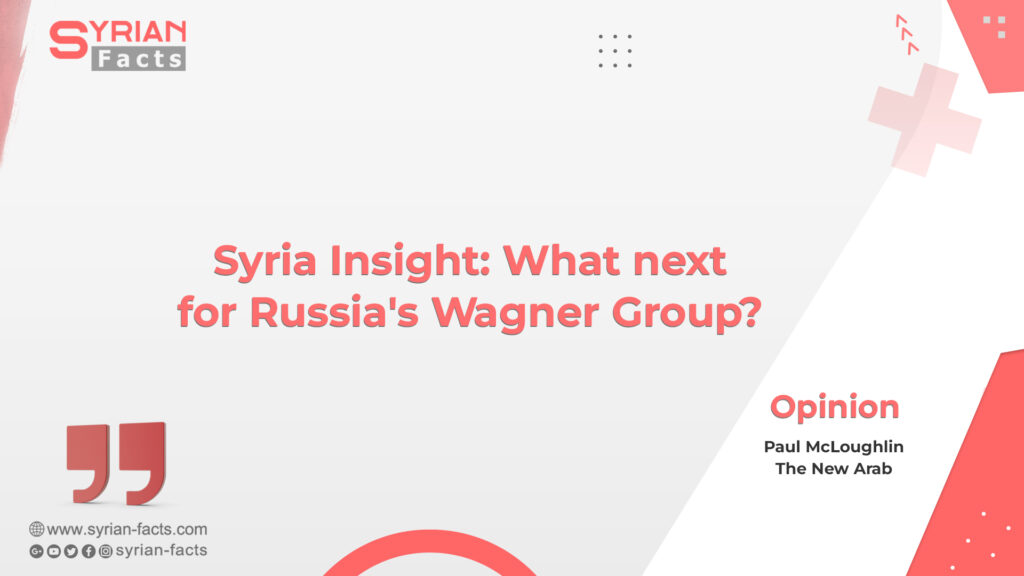After weeks of haranguing Russian military commanders, Wagner Group leader Yevgeny Prigozhin on 24 June ordered his fighters to take over the garrison city of Rostov-on-Don and head for Moscow, sparking fears of civil war in Russia.
Almost as quickly as it began the mutiny was quelled, with Prigozhin and his fighters given the option of an uncertain Belarusian exile or signing up to the Russian military, although the outcome of this ultimatum remains unclear.
For Wagner fighters in Syria, the sight of comrades marching on the Russian capital must have been a surreal one given their mission to help the Assad regime crush its own armed rebellion.
The presence of the Russian mercenaries billeted around mines or oil fields in eastern Syria serves as a stark reminder of the matrix between Wagner and Vladimir Putin’s grand vision for Moscow.
It also underlines a reliance on murky private military companies (PMCs) for protecting Russian overseas interests, as the US had done in Iraq, amid Moscow’s resurgence on the international scene and a scramble for natural resources in the Middle East and Africa.
.
Prigozhin, a former chef who became a close confidant of Vladimir Putin, concocted a ragtag mercenary force of former military personnel, football hooligans, convicts, and bored youth from Russia’s hopeless hinterland, paired with an overseas business empire.
Powerful, self-sufficient, and ruthless, Wagner fighters are present on the frontlines of Ukraine, guarding oil fields in Syria and Libya, and operating gold mines in the Central African Republic.
Following the mutiny, the question of how to deal with Wagner in Syria will undoubtedly be a sensitive one for the Kremlin, given the group’s role in supporting a fragile foreign ally and protecting Russian interests there.
.
There is the possibility of tensions between Wagner mercenaries and Russian military personnel at shared bases in Syria, such as at Hmeimim airfield in Latakia, but this will likely be offset by each having their own separate responsibilities and objectives, said Katrina Sammour, an Amman-based security analyst.
“Russia has a variety of missions in Syria. The main one is the stabilisation of Assad’s power, training and building the Syrian military to take control of the country, weapons sales, energy rights, and using it as a geopolitical platform for the MENA and the Mediterranean,” Sammour told The New Arab.
“Wagner was largely contracted to protect energy interests in Syria with a few times, like Palmyra, they joined in general fighting. So the morale for forces in Syria is less of an issue.”
According to a recent Reuters report, the Russian military swiftly dealt with Wagner forces in Syria when the rebellion broke out in Ukraine with phone and internet lines cut, Wagner commanders summoned, and mercenaries given a choice of signing new contracts or leaving Syria.
.
Other Russian PMCs, such as Redut, are also active in Syria and have been in active competition with the Wagner Group and are closer to the Russian military establishment.
Anton Mardasov, a non-resident scholar at the Middle East Institute’s Syria Program, said the rivalry between Redut and Wagner has been most apparent overseas and the mutiny in Russia will do little to build trust between the two entities.
“Redut didn’t work in Africa, so everything remains the same there, since any gap is fraught with a subsidence of official Moscow’s positions,” he told The New Arab.
“Wagner began participating in the war in Ukraine belatedly against the background of the failures of the Redut PMC… participation in the Ukrainian war with the involvement of repeat offenders was an autonomous project from all foreign ones, and that situation persisted at the time of the rebellion.
“In addition, against the background of intense hostilities in Ukraine, business trips to Syria and Africa were considered an opportunity for them to relax.”
.
While the auditing of Wagner’s overseas presence abroad is now underway, the process has been slow and presented various challenges for Moscow, according to Mardasov.
“Wagner has an extensive structure in Syria, and no military police would dare to arrest. In general, not a single source confirms the disseminated information about the arrests of mercenaries or their gathering in Latakia for the mass transition under the control of the MoD,” he added.
“However, this doesn’t mean that there are no changes in Syria. As in Ukraine, Wagner’s mercenaries are offered to move to the Redut PMC, which has been working in Syria for several years, including at oil facilities in Deir az-Zour. Their services are more like the services of PMCs than the reckless work of mercenaries who participated in the assaults on Palmyra and Eastern Ghouta.”
.
Wagner’s key role in the propagation of Russia’s soft and hard power abroad and its close relationship with the Kremlin cannot be underestimated and predictions of its demise could be wholly misplaced, said Ruslan Trad from the Atlantic Council.
“I think we still have to speak in the present tense. Wagner, or what’s left as an operating structure, has the primary purpose of protecting Russian interests or the interests of Russian allies on whose territory that unit’s fighters are stationed,” Trad told The New Arab.
“Since Wagner has a special forces connection and was created by the GRU (Russian military intelligence), the group also has an ‘intelligence’ character. In Syria, Wagner guarded critical infrastructure of the Assad regime, and later operated on the front lines in various parts of Syria. As always, Wagner operated effectively, within, and never outside, of the Russian military command.”
.
With well-trained fighters, higher salaries, and good weaponry, particularly for those outside Ukraine, Wagner attracted envy and suspicions within the Russian officer class.
Its role in ensuring Moscow’s phosphate interests in Deir az-Zour undoubtedly kept Wagner in a position of privilege but tensions with the Russian military were largely subdued due to the Russian leadership’s common goal in Syria, Trad said.
“Syria, to many Russian soldiers, is like a holiday venue where they can serve to receive a better pension,” Trad noted.
.
The Kremlin will be mindful of possible grievances brewing in Syria, as happened when Wagner fighters were massacred by US-led forces in Deir-az-Zour in 2018 and the incident then re-emerged five years later as a pretext for Prigozhin’s mutiny in Ukraine.
“I wonder if there will be groups of angry Wagner members who wanted Prigozhin to go further and also groups of angry soldiers, in general, who would join forces with those disillusioned with Wagner,” Trad added.
“For now, Wagner looks set to become history, and the Russian army looks united. Syria, in this context, could be a useful place to start plotting or creating problems for Moscow.”
The New Arab





Be the first to write a comment.